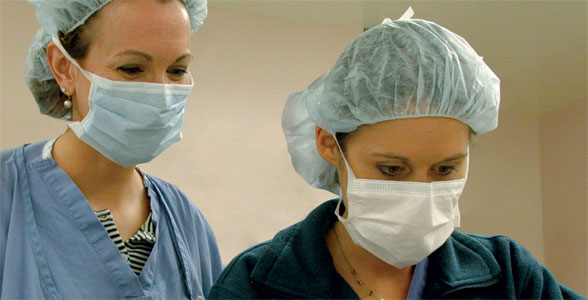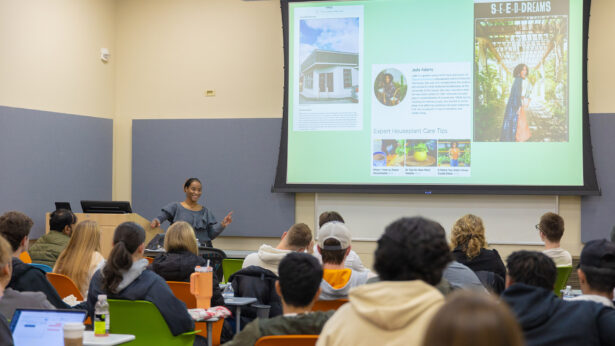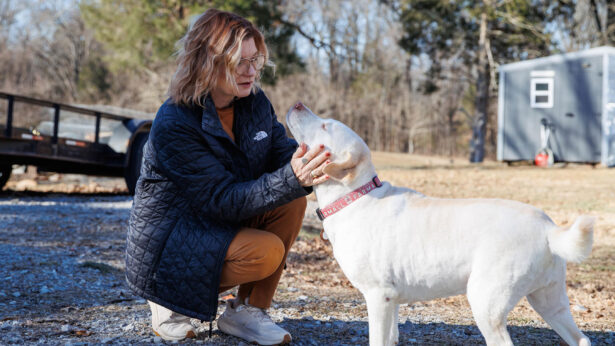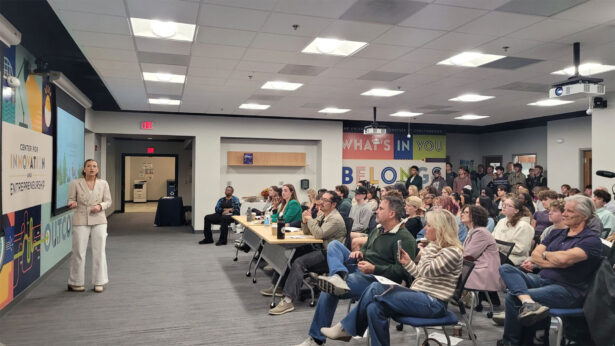Beloved Sesame Street character Big Bird once said “It’s no fun to be sick,” and he wasn’t kidding. Taking time off work for a doctor’s visit, getting poked and prodded, and maybe having surgery and a hospital stay is the last thing anyone wants. Of course, the expectation is that all this would happen in a sterile environment with the best medicines administered, all in a timely, unobtrusive way. But try to imagine that scenario without the assistance of a nurse.
As the baby-boomer generation ages and legions of nurses approach retirement age, the quantity and quality of tomorrow’s nursing workforce is in question. UT Chattanooga is addressing the looming shortage in several ways.
Dr. Kay Lindgren, director of the UTC School of Nursing, is excited about a series of major grants that do everything from planting the idea of a nursing career in the minds of middle-school students to helping registered nurses earn Bachelor of Science degrees. “We’ve been very fortunate this year to be awarded major grants so UTC can encourage nursing careers, train nurses to attain higher degrees, and encourage leadership among professional nurses,” Lindgren says. “We’re also proud of an ongoing partnership with Mississippi State that benefits certified registered nurse anesthetists. UTC is engaged at every level as we address the nursing shortage in our region.”
Gateway Program targets RN-to-BSN
An $800,000 federal grant from the Health Resources and Services Administration has opened the Gateway Program for working registered nurses with 2-year degrees who want to earn 4-year Bachelor of Science in Nursing degrees.
“One of the objectives of the grant is to decrease the amount of time professional RNs must spend to complete the Bachelor of Science in Nursing,” says Dr. Susan Davidson, project director of the Gateway Program at UTC. “In the Gateway Program, an RN can become a BSN in twelve to fourteen months. This learning experience was planned for the busy working RN who needs to maintain career and family roles. It allows maximum college credit for previous educational experiences.”
Beginning in May 2008, the fully accredited Gateway Program will offer day and evening classes, conducted both online and in the classroom. Courses will reflect the expanded role of the nurse and will include physical assessment, pathophysiology, nursing research, management, and community-public health nursing.
“Although most of the course work is online, there are many opportunities for students to meet with advisors,” Davidson says. “Faculty assistance and support is readily available.”
Outstanding nursing alumni provide an additional dimension of support for students, providing professional leadership in the region. When it is time for these students to embark on a flexible and innovative clinical practicum, Gateway Program students will be offered a variety of community settings.
DREAMWork to increase diversity
Tennessee has a minority population of 20 percent, but minorities constitute only 10 percent of the state’s nursing workforce. Similarly, minorities are 37 percent of the population in Georgia but only 20 percent of the nursing workforce. To address this disparity, the Health Resources and Services Administration awarded the UTC School of Nursing a $912,000 grant to implement the Diversity Recruitment and Education to Advance Minorities in the Nursing Workforce (DREAMWork) project.
The program will increase nursing education opportunities for students from disadvantaged backgrounds, particularly those from underrepresented minorities in the nursing workforce. The project includes an array of activities to help minority students as they prepare for School of Nursing course work and the National Council Licensure Examination, a standardized exam that each state board of nursing uses to determine whether a candidate is prepared for entry-level nursing practice.
“This recruitment and retention program begins with very young children,” says Dr. Martina Harris. “Students in middle school and also high school will be encouraged to consider nursing as a career option.”
Harris, assistant professor and director of the DREAMWork project, says the DREAMWork plan includes pre-entry preparation, student stipends, and retention activities to address the barriers that exist along the educational pipeline.
Incoming college freshmen transitioning to college life, pre-nursing students, and students enrolled in the School of Nursing will also benefit from the DREAMWork plan, Harris says. She will engage the community by establishing advisory and mentoring relationships between participants and members of the Chattanooga chapter of the Black Nurses Association.
Opportunities for rural nurses
Continuing education needs for nurses in rural Northwest Georgia and Southeast Tennessee prompted Dr. Cherry Guinn, associate professor of nursing at UTC, to take action. She wrote a proposal, one of six selected nationwide for 3 years’ worth of funding by the Health Resources and Services Administration.
Guinn’s idea has become reality with an annual 3-day professional development workshop for regional health professionals specializing in maternal and child health. The funds will be used to establish a network to facilitate communication among rural nurses, enabling them to get guidance and support from one another. Rural nurses will also benefit from strategies to promote wellness and prevention so that health crises among vulnerable mothers and children can be averted.
Mississippi partnership continues
UTC has a record enrollment for the 2007-08 academic year, but eight of those students aren’t even on campus. They are participating in a long-distance education program to become certified registered nurse anesthetists (CRNAs) in Mississippi, another creative way UTC is working to address nursing shortages in rural areas.
Erlanger Health System has been an essential partner with the program from its inception. For many years Erlanger was the only option for clinical-experience sites, but in 2003, a long-distance education option for clinical experiences became available through a partnership with North Mississippi Medical Center. Five students who began the program in 2006 and three who began in 2007 had their first summer semester at UTC in 2007. Then they went to Tupelo for their clinical rotations.
“North Mississippi Medical Center has more than six-hundred beds, making it the largest hospital in Mississippi and the largest non-metropolitan hospital in the United States,” says Dr. Linda Hill, coordinator of the UTC nurse anesthesia concentration.
Completing the highly competitive nursing anesthesia program demands commitment. Recruiters receive four applications for each slot in the program, according to Hill. Applicants are required to have a minimum of 1 year of critical-care nursing experience. Two years of critical-care experience are recommended, particularly if the applicant has no other clinical nursing experience. Including the undergraduate work, students can expect to spend 7 years to complete this program, which combines classroom instruction and clinical experience.
“These students get involved in every type of surgical procedure–open-heart surgery; Cesarean section births; regional anesthesia, including epidurals and spinals; pediatrics; and geriatrics–the CRNA provides the care,” Hill says.
Before a UTC CRNA student sits for certification, he or she must complete at least 550 cases. “Because of the high level of clinical experiences that our students complete, UTC continually graduates top-quality healthcare professionals,” Hill says.
The average UTC CRNA student completes 988 cases, “well above the requirement to sit for certification,” Hill says. Most student nurse anesthetists log 1,700 hours in the operating room, compared with the average 2,400 hours of operating-room experience UTC CRNAs have, she says.
Besides clinical rotations at Erlanger Health System and North Mississippi Medical Center, UTC students also go to Memorial Hospital in Chattanooga; Floyd Medical Center in Rome, Georgia; Hamilton Medical Center in Dalton, Georgia; and Grandview Medical Center, which serves Jasper and Marion counties in Southeast Tennessee.
For more information about any of these programs, call the UTC School of Nursing at 423-425-4644.



